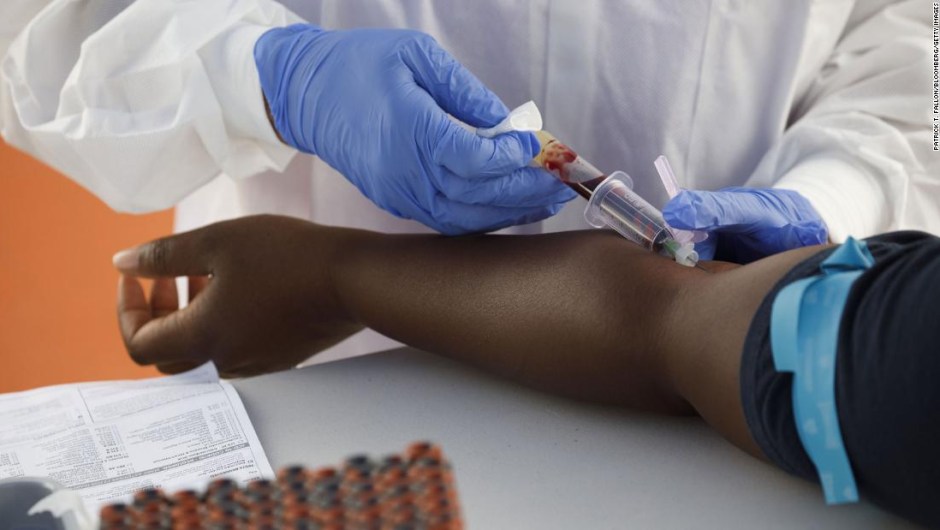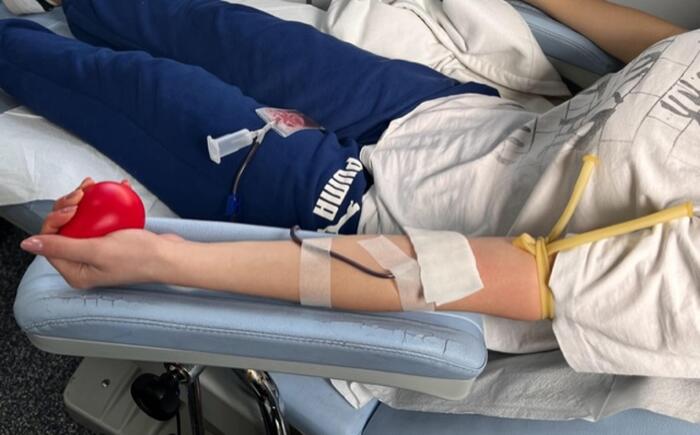(CNN) -
People with blood type O may be less vulnerable to covid-19 and are less likely to become seriously ill, according to two studies published Wednesday.
Experts say more research is needed.
Research provides more evidence that blood type (also known as blood type) may play a role in a person's susceptibility to infections and their likelihood of having a severe episode of the disease.
The reasons for this link are unclear and more research is needed to say what implications, if any, it has for patients.
Studies add to growing evidence
A Danish study found that among 473,654 people who were tested for COVID-19, only 38.4% with blood type O tested positive, although, among a group of 2.2 million people who did not did the test, that blood type represented 41.7% of the population.
In the other study, researchers in Canada found that among 95 critically ill covid-19 patients, a higher proportion with blood type A or AB (84%) required mechanical ventilation compared to patients with blood group O or B, That was 61%.
The Canadian study also found that those with blood type A or AB had a longer stay in the intensive care unit, a median of 13.5 days, compared to those with blood type O or B, who had a median of nine days.
advertising
MORE: Experimental treatment Trump received would have affected his blood tests showing antibodies, says Regeneron
«As a doctor… I have in mind when I look at patients and I stratify them.
But in terms of a definitive marker, we need repeat findings in many jurisdictions that show the same thing, ”said Dr. Mypinder Sekhon, an intensive care physician at Vancouver General Hospital and author of the Canadian study.
"I don't think this is a substitute for other risk factors for severity such as age and comorbidities, etc.," added Sekhon, who is also a clinical assistant professor in the Division of Critical Care Medicine and the Department of Medicine at the University of British Columbia.
'If you're blood group A, you don't need to panic.
And if he is blood group O, he is not free to go to pubs and bars.
No need to worry
Most humans belong to one of four blood groups: A, B, AB, or O. In the United States, the most common blood groups are O and A.
It makes very little difference in the daily life of most people unless you have to receive a blood transfusion.
People should also not be unduly concerned about the link between blood type and COVID-19, said Dr. Torben Barington, lead author of the Danish paper and clinical professor at Odense University Hospital and the University of Southern Denmark.
"We don't know if this is some kind of protection of group O, or if it is some kind of vulnerability in the other blood groups," he said.
"I think this is of scientific interest, and when we find out what the mechanism is, maybe we can proactively use it in some way with respect to treatment."
In the Danish study, researchers analyzed data on Danish individuals who were tested between February 27 and July 30, and the distribution of blood types among those people was compared with data from people who had not been tested.
They found that blood group was not a risk factor for hospitalization or death from COVID-19.
Both studies were published in the journal Blood Advances.
While there are several theories, researchers do not yet know what mechanism could explain the link between different blood groups and COVID-19.
Sekhon said it could be explained because people with blood type O have less key clotting factor, making them less prone to blood clotting problems.
Clotting has been a major factor in the severity of Covid-19.
Other possible explanations involve blood group antigens and how they affect the production of antibodies that fight infection.
Or it could be related to genes associated with blood types and their effect on immune system receptors.
"It's an interesting and repeated scientific observation that really warrants more mechanistic work," he said.
'Important research question'
The findings from the two new studies provide "more convergent evidence that blood type may play a role in a person's susceptibility to covid infection and their likelihood of having a severe episode of covid-19," stated Dr. Amesh Adalja, a principal investigator at the Johns Hopkins University Center for Health Security in Baltimore, who was not involved in any of the studies.
A separate study, published in The New England Journal of Medicine in June, found genetic data in some COVID-19 patients and healthy people suggesting that those with type A blood were at increased risk of infection, and those with type O blood were at a lower risk.
That previous genetic study, along with the two new studies in Blood Advances, "suggest that this is a real phenomenon that we are seeing," said Adalja, whose work focuses on emerging infectious diseases.
“While we are not quite at the point where this is ironclad, it is clearly suggestive and we have not seen anything inconsistent with this.
The same pattern has suggested with blood type O, which tends to be the one that stands out, ”explained Adalja.
LOOK: Does blood type have to do with the most serious cases of coronavirus?
Adalja ensures that blood types and their susceptibility to various infections have been previously studied in the medical literature.
For example, research suggests that people with blood type O appear to be more susceptible to norovirus infection.
Regarding the new coronavirus that causes covid-19, “We need to discover the mechanism and understand it at the molecular level to be able to say with certainty how this happens: that this is really blood type O and not something that you associate with blood type Or ", Adalja pointed out.
"We're starting to see enough now that I think it's an important research question to answer," he said.
"There is more science to be done here, but it seems to me that there is more accumulating evidence for this hypothesis."
covid-19









